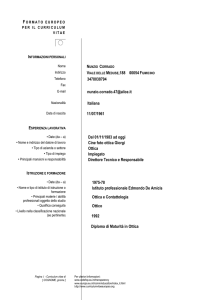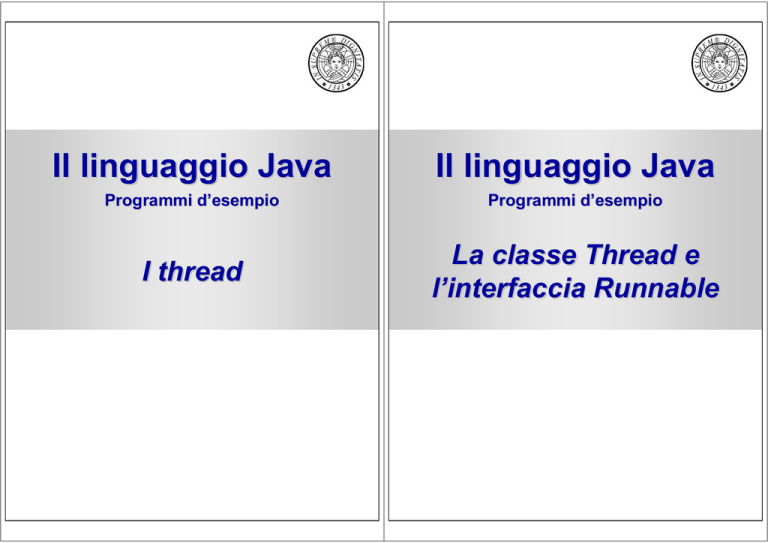
Il linguaggio Java
Il linguaggio Java
Programmi d’esempio
Programmi d’esempio
I thread
La classe Thread e
l’interfaccia Runnable
Classe Thread
L'interfaccia Runnable
public class SimpleThread extends Thread {
public SimpleThread(String str) {
super(str);
}
public class SimpleThread implements Runnable {
private Thread thr;
public SimpleThread(String str) {
thr = new Thread(this, str);
thr.start();
}
public void run() { // sovrapposizione
for (int i = 0; i < 10; i++) {
System.out.println(i + " " +
getName());
try {
sleep((long)(Math.random()*1000));
} catch(InterruptedException e) {}
}
System.out.println("FINITO! " + getName());
}
public static void main (String[] args) {
new SimpleThread("Pippo").start();
new SimpleThread("Pluto").start();
public void run() { // implementazione
for (int i = 0; i < 10; i++) {
System.out.println(i + " " + thr.getName());
try {
Thread.sleep((long)(Math.random()*1000));
} catch (InterruptedException e) {}
}
System.out.println("FINITO! " + thr.getName());
}
}
}
public static void main (String[] args) {
new SimpleThread("Pippo");
new SimpleThread("Pluto");
}
}
TIGA
I thread
3
TIGA
I thread
4
Il metodo join
Il metodo yield
public class MyThread extends Thread {
private int tick = 1;
private int num;
private final static int NUMTHREAD = 2;
public class JoinDemo extends Thread {
public JoinDemo(String name) {
super(name);
}
public static void main(String[] args)
throws InterruptedException {
System.out.println("main start");
Thread t = new JoinDemo("pippo");
t.start();
t.join(); // comment this line
System.out.println("main end");
}
public void run() {
System.out.println(getName() + " start");
for (int tick = 0; tick < 10000; tick++);
System.out.println(getName() + " end");
}
}
// output
// main start
// pippo start
// pippo end
// main end
TIGA
public void run() {
while (tick < 400000) { // CPU-intensive code
tick++;
if ((tick % 50000) == 0) {
System.out.println("Thread #" + num +
", tick = " + tick);
//
yield(); // (1)
}
}
}
public static void main(String[] args) {
MyThread[] runners = new MyThread[NUMTHREAD];
for (int i = 0; i < NUMTHREAD; i++) {
runners[i] = new MyThread(i);
//
runners[i].setPriority(NORM_PRIORITY+i); // (2)
}
for (int i = 0; i < NUMTHREAD; i++) runners[i].start();
}
}
output senza join
main start
main end
pippo start
pippo end
I thread
public MyThread(int num) {
this.num = num;
}
5
TIGA
I thread
6
Lock rientranti
public class Rientrante {
public synchronized void a() {
b();
System.out.println("Sono in a()");
}
public synchronized void b() {
System.out.println("Sono in b()");
}
public static void main(String[] args) {
Rientrante r = new Rientrante();
r.a();
}
}
Il linguaggio Java
Programmi d’esempio
Produttori e consumatori
// output
// Sono in b()
// Sono in a()
TIGA
I thread
7
Produttore e consumatore (I)
Produttore e consumatore (II)
// Il produttore
// Il consumatore
public class Consumatore extends Thread {
private Buffer buffer;
private int number;
public class Produttore extends Thread {
private Buffer buffer;
private int numero;
public Consumatore(Buffer b, int numero){
buffer = b;
this.number = numero;
}
public Produttore(Buffer b, int numero) {
buffer = b;
this.numero = numero;
}
public void run() {
int valore = 0;
for (int i = 0; i < 10; i++) {
valore = buffer.get();
System.out.println("Consumatore #" + this.number +
" got: " + valore);
}
}
public void run() {
for (int i = 0; i < 10; i++) {
buffer.put(i);
System.out.println("Produttore #" + this.numero +
" put: " + i);
}
}
}
}
TIGA
I thread
9
TIGA
I thread
10
Produttore e consumatore (III)
// Il buffer
public class Buffer {
private int valore;
private boolean disponibile = false;
public syncronized int get() {
int v;
while (disponibile == false)
try {
wait();
} catch(InterruptedException e){}
disponibile = false;
v = valore;
notifyAll();
return v;
}
}
Il linguaggio Java
Programmi d’esempio
Gestore di un pool di
risorse equivalenti
public synchronized void put(int value) {
while (disponibile == true)
try {
wait();
} catch(InterruptedException e){}
valore = value;
disponibile = true;
notifyAll();
}
TIGA
I thread
11
Gestore (1)
Gestore (2)
public class Gestore {
synchronized int richiesta() {
// numero totale di risorse
private final int N;
// se risorse[i] = true, la risorsa i è disponibile
private boolean[] risorse;
// numero delle risorse disponibili
private int disponibili;
public Gestore(int numRisorse) {
N = numRisorse;
disponibili = N;
risorse = new boolean[N];
for (int i = 0; i < N; i++) risorse[i] = true;
}
}
synchronized void rilascio(int i) {
System.out.println(“Rilascio risorsa " + i);
risorse[i] = true;
disponibili++;
notify();
}
} // class
public Gestore() {this(2);}
// continua
TIGA
I thread
if (disponibili <= 0)
try {
wait();
} catch(InterruptedException e){}
int i = 0;
while ((i < N) && !risorse[i]) i++;
risorse[i] = false;
disponibili--;
System.out.println("Alloco risorsa " + i);
return i;
13
TIGA
I thread
14
Gestore (3)
class MioThread extends Thread {
final int TIMES = 2;
Gestore g;
public MioThread(String name, Gestore gest) {
super(name);
g = gest;
}
public void run() {
int r;
for (int i = 0; i < TIMES; i++) {
r = g.richiesta();
try{
sleep((long)(Math.random()*1000));
} catch(InterruptedException e){}
g.rilascio(r);
}
}
Il linguaggio Java
Programmi d’esempio
Buffer di lunghezza limitata
}
//////////////////////////////////////////////
public class DriverGestore {
public static void main(String[] args) {
final int NUMTHREADS = 3;
final int NUMRISORSE = 2;
Gestore g = new Gestore(NUMRISORSE);
for (int i = 0; i < NUMTHREADS; i++)
new MioThread("thread[" + i + "]", g).start();
}
}
TIGA
I thread
15
Buffer (I)
Buffer (II)
public class Buffer { // FIFO
private
private
private
private
private
Object[] buffer; // il buffer
final int SIZE; // capacità del buffer
int testa; // punto di inserimento
int coda; // punto di estrazione
int cont; // num oggetti presenti nel buffer
class Produttore extends Thread {
final int TIMES = 2;
Buffer buf;
public Produttore(String name, Buffer b) {
super(name);
buf = b;
}
public void run() {
int r;
for (int i = 0; i < TIMES; i++) {
String s = getName() + ": string " + i;
System.out.println(s);
buf.put(s);
try{
sleep((long)(Math.random()*1000));
} catch(InterruptedException e){}
}
}
public Buffer() {
this(10);
}
public Buffer(int sz) {
SIZE = sz;
buffer = new Object[SIZE];
cont = 0; testa = 0; coda = testa;
}
synchronized void put(Object elem) {
while (cont >= SIZE)
try {
wait();
} catch(InterruptedException e){}
buffer[testa] = elem;
testa = (testa + 1) % SIZE;
cont++;
notifyAll();
}
}
}
synchronized Object get() {
Object elem;
while (cont <= 0)
try {
wait();
} catch(InterruptedException e){}
elem = buffer[coda];
coda = (coda + 1) % SIZE;
cont--;
notifyAll();
return elem;
}
TIGA
I thread
17
TIGA
I thread
18
Buffer (III)
Buffer (IV)
class Consumatore extends Thread {
final int TIMES = 2;
Buffer buf;
public class DriverBuffer {
public static void main(String[] args) {
final int NUMPROD = 3;
final int NUMCONS = 3;
public Consumatore(String name, Buffer b) {
super(name);
buf = b;
}
public void run() {
int r;
for (int i = 0; i < TIMES; i++) {
String s;
s = (String)buf.get();
System.out.println(getName() +
" consuma “ + s);
try{
sleep((long)(Math.random()*1000));
} catch(InterruptedException e){}
}
}
Buffer buf = new Buffer();
for (int i = 0; i < NUMCONS; i++)
new Consumatore("cons[" + i + "]",
buf).start();
for (int i = 0; i < NUMPROD; i++)
new Produttore("prod[" + i + "]",
buf).start();
}
}
}
TIGA
I thread
19
TIGA
I thread
20
Scrittore
class Scrittore extends Thread {
final int TIMES = 5;
ReadWrite rw;
public Scrittore(String name,
ReadWrite rw) {
super(name);
this.rw = rw;
}
public void run() {
for (int i = 0; i < TIMES; i++) {
String name = getName();
rw.beginWrite();
System.out.println(name +
" begin write");
try{
sleep((long)(Math.random()*1000));
} catch(InterruptedException e){}
System.out.println(name +
" end write");
rw.endWrite();
}
}
Il linguaggio Java
Programmi d’esempio
Lettori e scrittori
}
TIGA
I thread
22
Lettore
DriverReadWrite
public class DriverReadWrite {
public static void main(String[] args)
throws InterruptedException {
class Lettore extends Thread {
final int TIMES = 3;
ReadWrite rw;
final int NUMREADERS = 2;
final int NUMWRITERS = 2;
Thread[] t =
new Thread[NUMREADERS + NUMWRITERS];
ReadWrite rw = new ReadWrite();
public Lettore(String name,
ReadWrite rw) {
super(name);
this.rw = rw;
}
public void run() {
String name = getName();
for (int i = 0; i < TIMES; i++) {
rw.beginRead();
System.out.println(name +
" begin read");
try{
sleep((long)(Math.random()*1000));
} catch(InterruptedException e){}
System.out.println(name +
" end read");
rw.endRead();
}
}
}
}
System.out.println("MAIN: BEGIN");
for (int i = 0; i < NUMREADERS; i++) {
t[i] =
new Lettore("lettore[" + i + "]", rw);
t[i].start();
}
for (int i = 0; i < NUMWRITERS; i++) {
t[i + NUMREADERS] =
new Scrittore("scrittore[" + i + "]",rw);
t[i + NUMREADERS].start();
}
for (int i = 0; i < NUMREADERS+NUMWRITERS;
i++)
t[i].join();
System.out.println("MAIN: END");
}
TIGA
I thread
23
TIGA
I thread
24
ReadWrite (II)
ReadWrite (I)
(in assenza di starvation)
(starvation sui lettori)
public class ReadWrite {
public class ReadWrite {
private
private
private
private
private
private
private int aw = 0; // num active writers
private int rr = 0; // num running readers
// a writer is in
private boolean busy_writing = false;
public ReadWrite() {}
synchronized void beginRead() {
ar++;
while ((aw > 0) && okWriter)
try {wait();} catch(InterruptedException e){}
ar--;
rr++;
}
public ReadWrite() {}
synchronized void beginRead() {
while (aw > 0)
try {
wait();
} catch(InterruptedException e){}
rr++;
}
synchronized void endRead() {
rr--;
if (aw > 0) {
okWriter = true;
okReader = false;
}
if (rr == 0) notifyAll();
}
synchronized void endRead() {
rr--;
notifyAll();
}
synchronized void beginWrite() {
aw++;
while (busy || (rr > 0) || ((ar > 0) && okReader))
try {wait();} catch(InterruptedException e){}
busy = true;
}
synchronized void beginWrite() {
aw++;
while (busy_writing || (rr > 0))
try {
wait();
} catch(InterruptedException e){}
busy_writing = true;
}
}
synchronized void endWrite() {
busy_writing = false;
aw--;
notifyAll();
}
TIGA
I thread
boolean okReader = true; // readers can proceed
boolean okWriter = true; // a writer can proceed
int aw = 0; // active writers
int rr = 0; // running readers
int ar = 0; // active readers
boolean busy = false; // a writer is in
}
25
synchronized void endWrite() {
busy = false;
aw--;
if (ar > 0) {
okReader = true;
okWriter = false;
}
notifyAll();
}
TIGA
I thread
26
ReadWrite (III)
Semaforo
(assenza di starvation)
public class ReadWrite {
private int ar = 0; // active readers
private boolean aw = false; // active writers
private int br = 0; // blocked readers
private int bw = 0; // blocked writers
private Semaphore rs = new Semaphore(0); // priv. sem.
private Semaphore ws = new Semaphore(0); // priv. sem.
public class Semaphore {
private int s;
public Semaphore(int v) {
s = v;
}
// a mutex by default
public Semaphore() { this(1); }
public void beginRead() {
synchronized(this) {
if (!aw && (bw == 0)) {
rs.v();
ar++;
} else br++;
}
rs.p(); // potentially blocking; outside of mutex
}
synchronized public void endRead() {
ar--;
if ( ar == 0 && bw > 0) {
aw = true;
bw--;
ws.v();
}
}
synchronized public void p() {
while (s <= 0)
try{
wait();
} catch(InterruptedException e){}
s--;
}
synchronized public void v() {
s++;
notifyAll();
}
}
// continua
TIGA
I thread
27
TIGA
I thread
28
ReadWrite (III)
(assenza di starvation)
public void beginWrite() {
synchronized(this){
if (ar == 0 && !aw) {
ws.v();
aw = true;
}
else bw++;
}
ws.p(); // potentially blocking; outside of mutex
}
synchronized public void endWrite() {
aw = false;
if (br > 0)
while (br >0) {
br--;
ar++;
rs.v();
}
else if (bw > 0) {
aw = true;
bw--;
ws.v();
}
}
Il linguaggio Java
Programmi d’esempio
Esempio di server
multithread
} // class ReadWrite
TIGA
I thread
29
Il server multi-thread
Il server multi-thread
import java.io.*;
import java.net.*;
public class Server {
static final int PORT = 8080;
class ServerThread extends Thread {
private Socket socket;
private BufferedReader in;
private PrintWriter out;
public static void main(String[] args)
throws IOException {
ServerSocket s =
public ServerThread(Socket s)
throws IOException {
socket = s;
in = new BufferedReader(
new InputStreamReader(
socket.getInputStream()));
out = new PrintWriter(new BufferedWriter(
new OutputStreamWriter(
socket.getOutputStream())), true);
start();
}
public void run() {
try {
while (true) {
String str = in.readLine();
if ( str.equals("END") ) break;
System.out.println("Echo: " + str);
out.println(str);
}
} catch(IOException e) {
} finally {
try{
socket.close();
} catch(IOException e) {}
}
}
} // continua
TIGA
I thread
new ServerSocket(PORT);
try {
while ( true ) {
Socket socket = s.accept();
try {
new ServerThread(socket);
} catch(IOException e) {
socket.close();
}
}
} finally {
s.close();
}
}
}
31
TIGA
I thread
32
TimerTask
import java.util.Timer;
import java.util.TimerTask;
Il linguaggio Java
Programmi d’esempio
I timer task
public class Reminder {
class RemindTask extends TimerTask {
public void run() {
System.out.println("E' l'ora!");
timer.cancel();
}
}
Timer timer;
public Reminder(int seconds) {
timer = new Timer(); // creazione timer
// creazione e scheduling di un timer thread
timer.schedule(new RemindTask(), seconds*1000);
}
public static void main(String args[]) {
System.out.println("Sto per schedulare il task.");
new Reminder(5);
System.out.println("Task schedulato.");
}
} // class Reminder
TIGA
I thread
34
ReminderBeep
Esecuzione periodica di un thread
import java.util.Timer;
import java.util.TimerTask;
import java.awt.Toolkit;
import java.util.Timer;
import java.util.TimerTask;
public class ReminderBeep {
Toolkit toolkit;
Timer timer;
public ReminderBeep(int seconds) {
toolkit = Toolkit.getDefaultToolkit();
timer = new Timer();
timer.schedule(new RemindTask(),
seconds*1000);
}
class RemindTask extends TimerTask {
public void run() {
System.out.println(“E’ l’ora");
toolkit.beep();
//timer.cancel(); // JVM non termina
System.exit(0);
}
}
public static void main(String args[]) {
System.out.println(“Sto per schedulare
il task.");
new ReminderBeep(5);
System.out.println("Task schedulato.");
}
}
public class PeriodicReminder {
Timer timer;
public PeriodicReminder() {
timer = new Timer();
timer.schedule(new RemindTask(),
0, //ritardo iniziale
1*1000); //periodo
}
class RemindTask extends TimerTask {
int numVolte = 10;
public void run() {
if (numVolte > 0) {
System.out.println("E' l'ora");
numVolte--;
} else {
System.out.println("E' l'ora");
timer.cancel();
}
} // run
} // RemindTask
// main
}
TIGA
I thread
35
TIGA
I thread
36

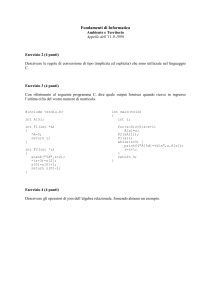
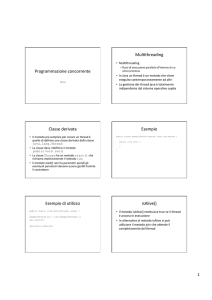

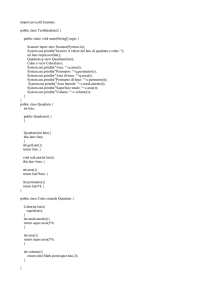

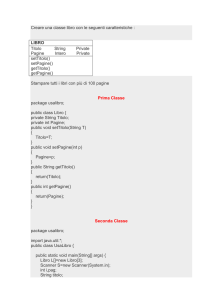
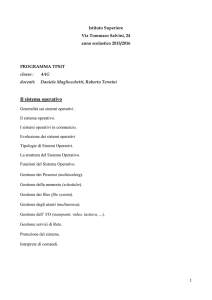
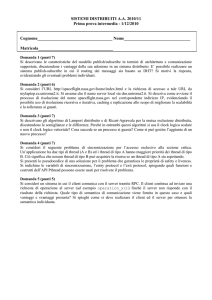
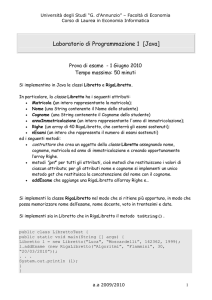
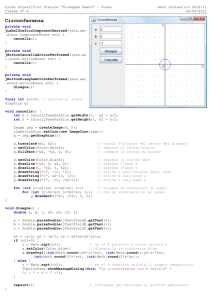
![Laboratorio di Programmazione 1 [Java]](http://s1.studylibit.com/store/data/000831980_1-771ffac978f8c249e8680878b4fef151-300x300.png)
